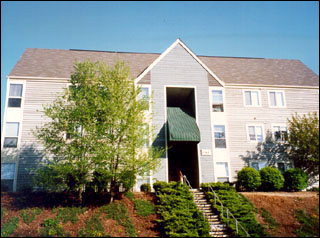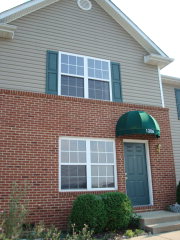| Newer Posts |
Buying College Student Rental Property |
|
 Lots of people consider buying investment properties -- and in Harrisonburg many people start by investigating college housing. Some don't end up buying, and here is why . . . Lots of people consider buying investment properties -- and in Harrisonburg many people start by investigating college housing. Some don't end up buying, and here is why . . .Limited Choices Most of the student housing that exists in Harrisonburg today is corporately owned --- each unit isn't owned by one or more people, the entire complex is owned by a corporation. Thus, if we look just at housing for JMU students, where individual housing units can be purchased, the choices quickly become boiled down to:
Limited Monthly Cash Flow Many investors aim to at least break even on a monthly basis -- they don't want to be losing money each month that they own an investment property. With this assumption, let's take a look at how the cash flow might work on a monthly basis for 1346-D Hunters Road, one example of a Hunters Ridge condominium for sale as of 12/20/2007. Price of $105k, 80% financed at 7.25%, self-managed Rental Income + $770 Mortgage (Principal & Interest) - $573 Condo Association Fee - $155 Real Estate Taxes - $45 Insurance - $35 Monthly Profit - $38 (a small loss) However, many potential investors call and indicate that they only want to use a 10% down payment, and that they plan to have a property management company take care of the property. Things get worse . . . Price of $105k, 90% financed at 7.25%, property management Rental Income + $770 Mortgage (Principal & Interest) - $645 Condo Association Fee - $155 Property Management - $77 Real Estate Taxes - $45 Insurance - $35 Monthly Profit - $225 (a big loss) Then Why??? With these monthly losses, you might wonder why someone would buy an investment property. There are a lot of possible reasons why someone might buy, or why the numbers might work differently for them:
| |
Price Corrections . . . How It Affects Us Right Here At Home |
|
 A friend (thanks Randy) pointed me to an interesting article published last month by Fortune Magazine that used some interesting data analysis to come to the conclusion that home values in most markets will "fall by double digits over the next five years." A friend (thanks Randy) pointed me to an interesting article published last month by Fortune Magazine that used some interesting data analysis to come to the conclusion that home values in most markets will "fall by double digits over the next five years." Lots of questions come to mind rather quickly . . . Both Richmond and D.C. are specifically studied and referenced to have large drops in home vales --- will this have a ripple effect on the Shenandoah Valley? It certainly could --- if the changes happen that this article predicts. According to Fortune's study, Richmond home values will drop by 22.3% over the next five years, and Greater D.C. area home values will drop by 25.1% in the same time frame. This could translate into a slow down in the upper end of our market, as many buyers come from these two metro areas to relocate or retire to the Central Shenandoah Valley. (This is already a segment of the market that is over-supplied --- having fewer buyers certainly won't help!) The analysis seems a bit drastic --- is this really grounded in good math? The math is fine, but the reasoning might be a bit faulty. The basic premise of the article is that "...over time the most reliable guide to home values is rents. In most markets people won't lay out much more in monthly costs to own a house or condo than they would to rent a similar property..." I have to disagree with this assessment --- buyers pay more than they would if they rented because of: principal reduction (part of housing outlay is returned in the future), appreciation (even more financial return for having owned rather than rented), and tax savings (from mortgage interest). The root argument in the Fortune article is that a correction may have to happen in many markets because home values increased so much more quickly than rental rates. I don't think that this difference alone is going to drag home values down --- supply and demand will bring about the increase or decrease. Have home values increased faster than rental rates in Harrisonburg? Indeed they have! Here's one example --- five years ago a two-story townhome in Beacon Hill could be bought for $100k or rented for $750/month. Home prices are 11x annual rental rates. Today you can buy a similar townhome for $160k or rent it for $875/month. Home prices are 15x annual rental rates. What does this mean for our local home values? Per Fortune Magazine's math, this means we need to see, and will see over the next five years a 27% correction. Rental rates will go up some, but home values will fall quite significantly. Our home prices will drop by 27%? Really? While we may see declines in some price ranges, a drop of 27% over the next five years would be shocking. I think it is more likely that rental rates will continue to climb to get closer to where they have been proportionate to home values in the past. | |
A Great Townhouse Opportunity! |
|
 The townhome to the right (1206 Wordsworth Court) is located in Beacon Hill Townes, and presents a great opportunity for investment --- depending on a few factors. Before we go any further --- I do not represent the sellers of this property, though another Realtor in my company does --- also, this property is owned by an asset management company, not an individual. The townhome to the right (1206 Wordsworth Court) is located in Beacon Hill Townes, and presents a great opportunity for investment --- depending on a few factors. Before we go any further --- I do not represent the sellers of this property, though another Realtor in my company does --- also, this property is owned by an asset management company, not an individual.In the past six months, 15 two-story townhomes have sold in Beacon Hill at an average price of $159,786. This townhome is priced at $148,000 --- thus providing a $12,000 margin. Please note, work is needed to bring this house up to a similar condition as the comparable sales. The two key factors to making this a great opportunity are: 1. Whether the buyer can do most of the work themselves. 2. The degree to which the seller will negotiate the price down below the asking price. If the eventual buyer will live in the house themselves and do most/all of the work themselves, they will only have the cost of materials for the repairs to be completed. Furthermore, if the seller can be negotiated down further, there will clearly be even more of an opportunity. Are you interested? Know of someone who is? Be in touch . . . 540-578-0102. scott@cbfunkhouser.com. | |
The Value of Title Insurance |
|
These days it seems like you can buy insurance for just about anything! Life insurance, health insurance, auto insurance, home owners insurance, and what's that --- title insurance? First off, "title" is a legal term for an owner's interest in a piece of property. When a property is sold, the Seller conveys "title" to the Buyer through the use of a recorded deed. Prior to closing, the closing attorney must conduct a "title search" to ensure the current owner can convey ownership of the property to the Buyer. So, if the title search would discover any problems with the title, why would the title need to be insured? There are a number of reasons why a buyer might purchase a property and then later discover a "title defect," including: forgery, impersonation, undisclosed or missing heirs, undisclosed (but recorded) prior mortgage or lien, fraud; erroneous or inadequate legal descriptions, lack of right of access, deed not properly recorded, etc. The possibility of these unknown title defects creates a need for title insurance, which is an insurance policy protecting the holder from loss sustained by defects in the title to the property. There are two main types of title insurance that may be involved in your transaction --- lender's title insurance and owner's title insurance. Your lender will require you to purchase a lenders title insurance policy on their behalf. This policy will be based on their interest in the property, the loan amount, and will allow them to recoup that money should the house be reclaimed by a prior owner due to an unknown title defect. The decision you will need to make at the closing table is whether to purchase an owner's title insurance policy. This policy would protect you from sustaining any future financial loss due to the discovery of a title defect. Title insurance involves a one time payment at closing, and the policy lasts as long as you own the property. While every situation is different, in almost all situations, I recommend that you buy title insurance. | |
Buyer Incentives Galore! |
|
 Centex Homes is running an outstanding "Year-End Savings Event" in a variety of the areas where they are currently building new homes. Communities in Virginia include Northern Virginia, Richmond, Williamsburg and Hampton Roads. Centex Homes is running an outstanding "Year-End Savings Event" in a variety of the areas where they are currently building new homes. Communities in Virginia include Northern Virginia, Richmond, Williamsburg and Hampton Roads.Unbelievably, they are offering the following incentives:
| |
Making An Offer About More Than Just Price |
|
When drafting an offer to purchase a property, there are many terms beyond just the contract price that must be carefully considered to maximize the possibility the offer will be accepted by the sellers. Even in what most would consider to be a buyers market, planning your offer must go further than simply determining the offering price. Negotiating points to consider include: PERSONAL PROPERTY FINANCING Sellers don't just look at the contract price --- they calculate their net proceeds based on the offer price and any credits or closing cost assistance. Only ask for assistance if you truly need it. DEPOSITS Having a professional inspect the property you are purchasing is usually a good idea; however if you only intend to do it for informational purposes, consider leaving it out of the contract negotiations and conducting it post-settlement. SETTLEMENT & POSSESSION Generally, there are two strategies: offer lower than you are willing to pay and try to negotiate to an acceptable price through a series of offers, or... offer the highest price you are willing to pay and hope it is accepted on the first offer. Generally, the first strategy is used more often in a buyers market, and the second strategy more often in a sellers market. Finally, try and research the seller's context for selling. That information can be invaluable in negotiating a successful contract. | |
The Changing Mortgage Market |
|
80/20 mortgages with a second mortgage covering the 20% down payment . . . adjustable rate mortgages to provide lower interest rates and payments . . . interest only mortgages to lower monthly payments even further . . . step-up mortgages with lower introductory rates . . . sub-prime mortgages for poor credit or high risk borrowers. This loosening of lending standards has led to an increase in mortgage delinquencies, and as indicated by the graph above, most of this increase has been with subprime borrowers. However, these recent changes in the mortgage market affect all borrowers: fewer programs, for example the disappearance (largely) of 80/20 loans . . . increased standards such as credit scores, cash reserves, debt limits . . . increased scrutiny in the underwriting process, delaying closings . . . Understanding these trends in the mortgage market will help you to make more educated decisions about when to buy, and how to fi nance your purchase. | |
| Newer Posts |
Scott Rogers
Funkhouser Real
Estate Group
540-578-0102
scott@funkhousergroup.com
Licensed in the
Commonwealth of Virginia
Home Search
Housing Market Report
Harrisonburg Townhouses
Walk Through This Home
Investment Properties
Harrisonburg Foreclosures
Property Transfers
New Listings

